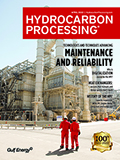
April 2022
Special Focus: Maintenance and Reliability
In May 2021, Phillips 66 started up a new methyl diethanolamine (MDEA)-based tail gas unit at its Belle Chasse, Louisiana, refinery.
Engineering is all about solving problems with efficient solutions by designing and building various technologies and techniques.
To operate reliably and profitably, oil refineries, petrochemical plants and gas processing facilities must avoid equipment failures.
Process equipment operating in a brownfield environment is often rerated pertaining to the changes in process parameters during debottlenecking.
Process Optimization
Corrosion is one of the most important challenges that refineries face (FIG. 1).<sup>1</sup>
Heat Transfer
Shell-and-tube heat exchangers (STHEs) are the most common heat transfer process equipment in all types of industrial plants.
One of the challenges in the operation of air cooled heat exchangers (ACHEs) is to decide whether or not to operate under natural convection.
Distillation towers consume ~30% of the energy in a refinery or petrochemical facility.
100th Anniversary
The 1950s marked an evolution in the use of oil by nations around the world.
Donald Campbell, Eger Murphree, Homer Martin and Charles Tyson—often called the ‘Four Horsemen’—are credited with the landmark invention of fluid catalytic cracking (FCC).
The following is a mixture of technical articles, columns and headlines published in the 1950s by <i>Petroleum Refiner,</i> the forerunner to <i>Hydrocarbon Processing</i>.
Sustainability
According to an industry report published by McKinsey and Co., accelerating the decarbonization of the U.S. economy to achieve net-zero targets by 2050 will require approximately $275 T of cumulative capital spending over the next 30 yr.1
Green Petrochemicals
Businesses and governments around the world have united behind the vision of a circular economy for plastics.
Environment and Safety
As refineries and petrochemical complexes worldwide are moving toward more automated operations, plant operators are increasingly becoming dependent on process alarms for safe, smooth and continuous operation.
Digital Technology
Hydrocarbon processing, by nature, is a high-risk operation.
Oil and gas companies are finding creative ways to look for solutions to new problems in the face of climate change and growing environmental awareness.
Process Controls, Instrumentation and Automation
Uncertainty in input parameters does not have an identical effect on uncertainty in the output.
Advanced industrial data analytics has a prominent role to play in process control and automation.
Columns
This year, <i>Hydrocarbon Processing</i> is celebrating its 100th anniversary. Throughout this year, the editors are publishing excerpts from past issues.
These days, regrettably, it is not unusual to encounter shallow thinkers.
Trends and Resources
New capital project announcements are down 27% in 1Q 2022 vs. 1Q 2021.
Chemical manufacturers worldwide are navigating an inflection point. Following the pandemic-fueled demand crash of 2020, a strong but stilted recovery unfolded in 2021.
H2scan, a leading provider of proven, proprietary H<sub>2</sub> sensors and technologies for the H<sub>2</sub> economy, has begun shipping prototypes of its new HY-OPTIMA™ 5000 Series designed for process industries (FIG. 1).

- India receives fuel oil cargo in Russian SCF tanker after brief halt 4/26
- Biden administration (U.S.) to release SAF tax credit model 4/26
- Boeing, Wagner advance Australia’s SAF Industry 4/26
- S-Oil expects Q2 refining margins to remain steady then trend upward 4/26
- Vitol to charter supertankers from U.S. to Nigeria's Dangote refinery 4/26
- Refiner Valero beats profit estimates on resilient demand, tight supplies 4/26




